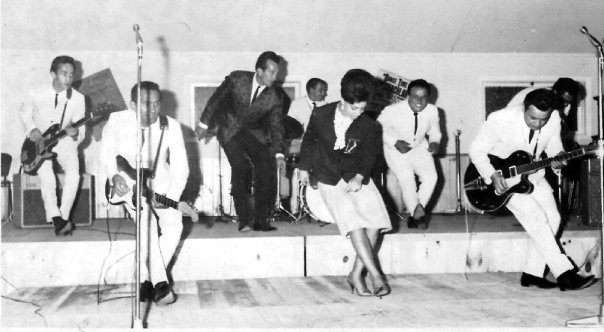
Māori Hi-Liners at Rex Hotel, Kings Cross, Sydney. Front row, from left: Gavin Ware, Helene Johnson, Matty Kemp. Back row: Matt Tenana, Barry Erickson, Gary Wahrlich on drums, Robby Ratana
My Travels Around The World As A Musician With The Māori Hi-Liners Showband
I am the son of Te Rito Haeata Kuku and Te Waiorirangi Te Whaiti and was given the name Keremeneta. Up until the age of six years my family lived on the marae called the Hiona Pa along with Uncle Jack and Aunty Maggie, Uncle Boonie, Aunty Snowy, Uncle Tom and Aunty Daisy, Uncle Mita, Aunty Kuini and all their whānau.
We were a very close family which I can say to this day remains. I can still vividly remember some of the waiata that our parents and older members of the families used to sing and perform at many of our communal gatherings. ‘E pare ra’, ‘He puri tai tama e’, ‘He puti puti kanehana e’, and many others.
My dad was very talented musically and played the mandolin, violin and piano accordion. He could also hold his own in singing and was a member of the family band and played dance music around the rohe. My mother also had a lovely voice but was not part of the band, she had to look after all us kids! I inherited my talents from my parents. So, as I take you on my musical journey I pay tribute to my family, who played an important part in my musical career.
I became a member of the Māori Hi-Liners showband in the mid-60s and associated with some of the great showbands of that era, namely the Māori Hi-Five, Māori Hi-Quins, Māori Castaways, Māori Volcanics, and the Quin Tikis. I played rhythm guitar and will pay tribute to “Red” Kerehi and my cousin, Nahu Haeata, from whom I gained a lot of knowledge as a guitarist.
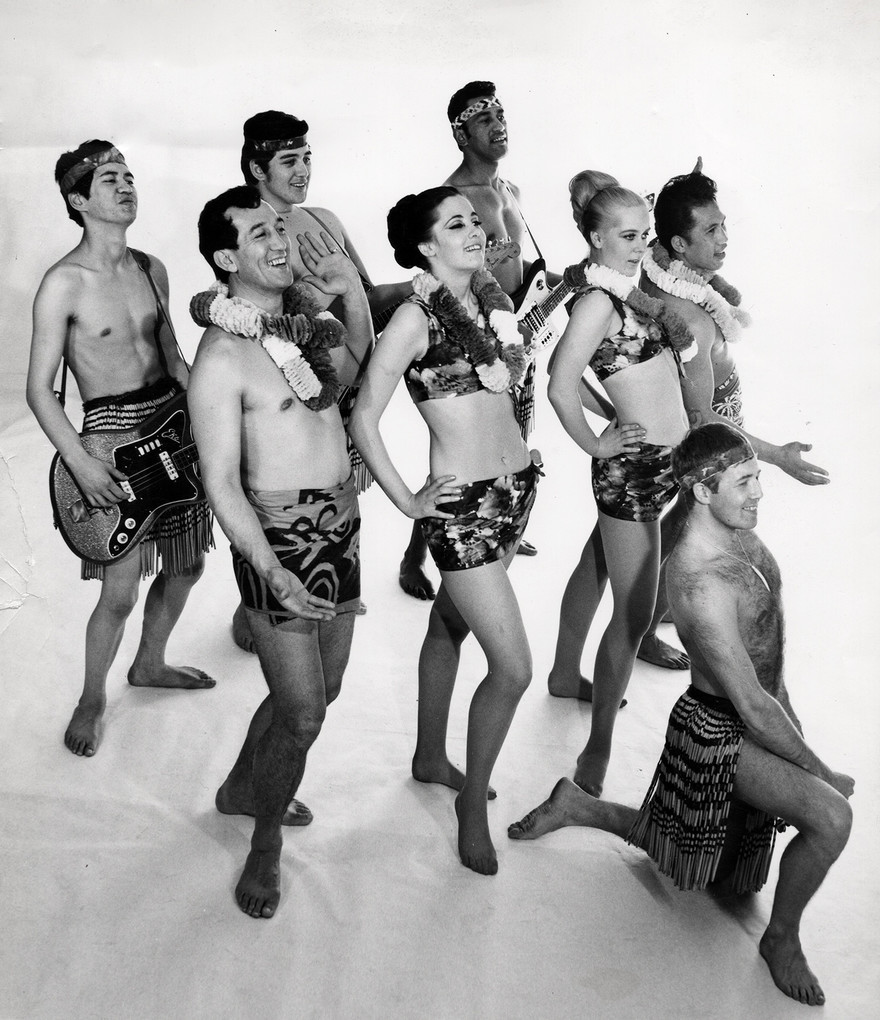
Māori Hi-Liners: a publicity photo taken in the UK for manager Derek Rawdon. - Chris Bourke Collection
Red and Nahu were both good guitarists in their own right and played a lot at family gatherings, parties, etc. I used to go along and just to watch them play and to my recollection Red was the first guitarist to have a double-necked guitar in the Wairarapa. Red was from Levin and married my cousin Hiona “Noni”.
I left Masterton in the early 1950s, working in Mangakino milking cows as a cowboy with my brother Tom on his farm on Mitchells Road. I also come from a shearing family as my dad was a “gun” shearer in Wairarapa and ran shearing gangs and taught me the art of shearing. I was to become a shearer, with my uncle Joe “Toot” Te Whaiti, who ran the shearing gang in Mangakino, and I shore 134 on my first day, and I had to shout a 10-gallon cream can of beer!
I moved on to Taupō, working on the geothermal steam project at Wairakei, then joined the army, serving three years with the armed forces in Malaya, 1961-63. On retiring from the army, I went to Sydney to be the best man at my brother Robert’s wedding. I met Barry Erickson who was involved in a lot of entertainment performing at nightclubs and RSLs. It was at one of the nightclubs called the Tiki Village in Kings Cross that I met Wi Wharekura and Noel Kingi from the Howard Morrison Quartet, which had disbanded. We went to the club to support Eddie Low and John Rowles who were just starting out in show business. It was at the Rex Hotel that I met the incomparable Prince Tui Teka, who had his own group at the time, The Troubadours. I was to become involved with Tui as an entertainer in later times in show business in England and Europe.
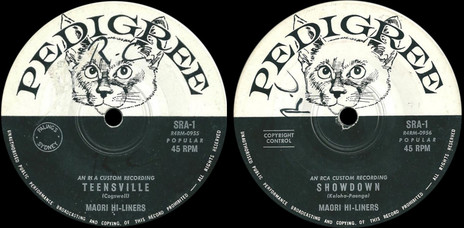
The Māori Hi-Liners - Teensville b/w Showdown 7" (Pedigree, Australia, 1964)
It was the first week of November 1965 when the Māori Hi-Liners boarded the Patrese. The group comprised Barry Erickson from Taupō on drums and vocals, Kelly Haeata from Masterton on rhythm guitar and vocals, Robbie Williams from Auckland on lead guitar and vocals, and Brian – an Aussie – on bass. Barry, being in show biz for a number of years, managed to seal the deal for us to entertain on the ship and earn a free passage to Greece. The trip took roughly six weeks, and we practised new songs to become more professional in our performance, doing an afternoon show as well as an evening dance and show.
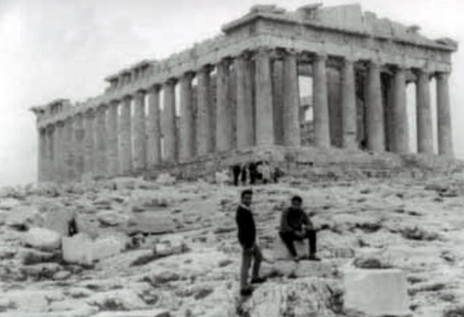
Māori Hi-Liners outside the Acropolis, Athens, Greece
The passengers were mainly Greek families returning to their homeland for Christmas, with sprinklings of Aussies, Pommies, and Americans. The captain thought we were pretty good, and he invited us twice to dine at the Captain’s table which was a privilege during our voyage. At the completion of the trip he gave us a “high recommendation” to work on any shipping liners as entertainers.
We sailed the Indian Ocean up to Colombo (Sri Lanka), spent a day there sightseeing, while the ship took on more stores and water etc. That night we set sail for Aden (Yemen) and it was during this part of the voyage that the purser in charge of entertainment approached Barry to see if we could come up with any new ideas. It was suggested that everyone could involved with a Hawaiian/Polynesian night, with passengers making their own hula skirts and leis out of crepe paper and dress up any fashion to have a ball and plenty of fun. Well, this went off with great success and everyone had the time of their life, even the elderly staunch Greeks!
We arrived in Aden to replenish supplies, then sailed up into the Red Sea, through the Suez Canal and three days later we arrived in Athens.
We spent six weeks sightseeing and working at local nightclubs and gaining quite a reputation as the “Meeoowry” (Māori) group. We rented one of the many flats owned by the Mayor of Athens and we cooked many boil ups: mutton or beef bones with pūhā. Yep, that’s right, we found pūhā on empty section lots or on private land.
On the ship we learnt enough of the Greek language to get by and this was a big test for us in the mainstream Greek population to enhance their customs, and we were treated with great respect. During that era the film Zorba the Greek was on show and the music from that film was played on a 10-stringed Greek instrument called a “bouzouki” – similar to an oversized Hawaiian ukulele. Robbie and I practised the tunes on our guitars and the Greek people were amazed at our professionalism and performance, as they had never seen it done on guitars. Again, our Māori kapa haka and Polynesian dances were well received. Although the money wasn’t that flash it paid for rent and food.
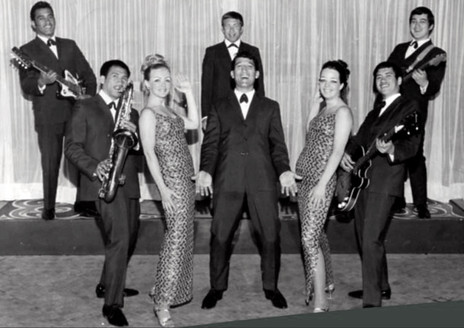
The Māori Hi-Liners at the Casino Estoril, Portugal. Back row: Kelly Haetea, Tony Blackburn, Pinky Paa. In front: Ben Moeva, Judy, Barry Erickson, Marilyn, Dennis Taiaroa.
We wanted to go to a more English-speaking country, and decided to travel by train to England, getting a travel pass through the Greek Consulate. It took about five days, travelling night and day, going through border control into Yugoslavia, Hungary, Czechoslovakia, Austria, Germany, and Belgium. Form there we boarded the ferry in Ostend and over to Dover, England. “Yippee!!!” – people speaking in English. “Wow!” – it was music to our ears. We boarded another train that took us into London, arriving at the OVC (Overseas Visitors Club) where people from all walks of life gathered and mingled, just to catch up with friends, also where groups of entertainers gathered.
We met up with the Māori Quin Tikis who had been performing at the club. They helped get us into a flat at the same place they were at and put in a good word to perform at the club. We performed our cabaret show twice a week, enough to pay the rent and a feed and that was it! Things were getting desperate and we had to find means of getting extra cash. The manager of the club got us a day job working at the brewery packing cases of wine and spirits for delivery and the four of us pooled our money and made things stretch.
We desperately wanted to do more cabaret work but not having a manager to manage and promote us was becoming quite frustrating. So, we decided that England wasn’t going to be our cup of tea and we made arrangements with the Shaw Savill shipping line to return to Aotearoa on the Southern Cross.
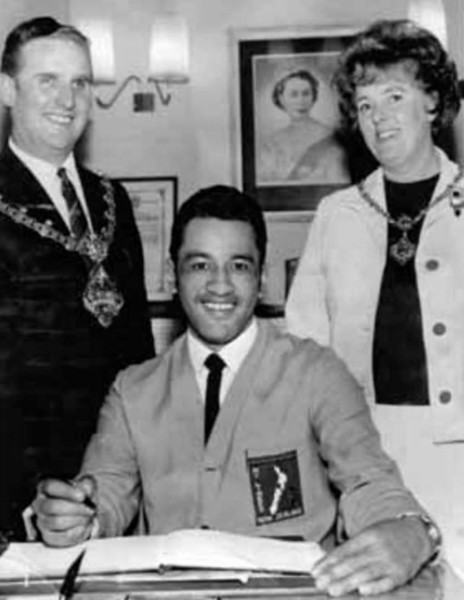
Māori Hi-Liners: Kelly Haetea signs the register in Sydney at his brother’s wedding.
However, it was during our last performance at the club that a gentleman by the name of Derek Rawdon happened to be searching for overseas talent, liked our show and wanted to take us there-and-then to perform in the Manchester nightclubs in the Midlands. If only he had been there a week earlier to see us perform, but we were contracted with the shipping company.
However, Derek wanted to manage us upon our return. It was about March, 1967, we boarded the Southern Cross in Brighton, South England, and set sail for Aotearoa knowing that on our return to England we would be under management, and be able to follow our dreams.
The voyages took us about six weeks, travelling through the Panama Canal, onto the Pacific Ocean, calling into Tahiti, Fiji, and windy Wellington.
We were a big hit on the ship with the passengers, and especially with Captain Moulder, who incidentally was a New Zealander and who gave us a “highly recommend” to travel on any Shaw Savill liner.
This was to become our passage back to England.
Europe and England, 1967
We boarded the P&O shipping liner Southern Cross in Wellington, during August 1967, having formed a new Māori Hi-Liners group.
The line-up was Barry Erickson from Taupō, on drums; Ben Moeva on xylophone and saxophone; Pinky Paa, Auckland, lead guitar; Dennis Taiaroa, Whanganui, bass; and Kelly Haeata, Masterton, on rhythm guitar.
We completely revised a new musical cabaret and dance show. We would practise often to perfect it for passengers and crew on the ship, doing morning matinee and evening dance music. The cruise took approximately five weeks, calling at Sydney, Perth, Durban, Cape Town, and our destination: Southampton, England. The passengers really enjoyed our music.
Derek Rawdon, whom we had met on our previous visit to England and who was to become our manager, met us off the ship. He had arranged accommodation in London, not too far away from the OVC (Overseas Visitors Club). The club was happy to see us back and put on a welcome back party for us. We thought this was really neat. We stayed in London for a week and did our normal gig for extra pocket money.
Derek had also arranged a new drummer. His name was Tony Blackburn. He was part-Ceylonese and part-English. Tony was to become a major asset to our team, not only for his drumming skills but for the five languages he could speak. Tony joined us on our last performance at the OVC with all his baggage of drum kits set up on the stage and did a two-minute solo. “Wow!” he blew us all away and received a standing ovation. We thought, “Jeez, that's our man.”
The following morning we boarded the train at Waterloo station for Manchester, where Derek met us and ferried us by taxi to the Musicians Hotel. That was to become our home for the next six months.
There were other “musos” there, an American Negro group called The Platters, whom we got to know very well. They were on the third floor, a great bunch of guys who were to become the “Fabulous Platters” and a household name in the years to come. We learnt a lot from them, especially harmonising and stage presentation. We went on to become a very professional show group.
All the entertainers at the hotel had their own times for practice in the lounge so there would be no clash and it was during the second week that Derek came to tell us of our “big break”. It was a 30-minute spot at a bingo hall. The theme was “Searching for Talent”.
Derek our manager came to tell us of our “big break”. It was a 30-minute spot at a bingo hall.
We were about to go on stage. The first two groups were young guys, just starting out. This was to be our big break and we certainly made the most of it. We were called for an encore and would you believe it, the club manager let us go for a further 20 minutes. Felt sorry for the three remaining groups but from that night it was the start of something big for the Māori-Hi-Liners.
Derek’s phone was running red hot the next day and people were asking for the “Meeoowry” to perform in a range of clubs around Manchester. By the way we got £10 each for our performance that night and it was off to the local steak shop for a fat juicy steak and chips and ciggies.
We were to have a crash course on promotional photos and then it was our first big break at working in nightclubs. We worked our butts off the first night and received a standing ovation. The Māori Hi-Liners had finally arrived and all the venues we worked were packed out. Sometimes, we would do two shows a night within a two-mile radius and the people just followed us around which was very common. We had a very strong support base.
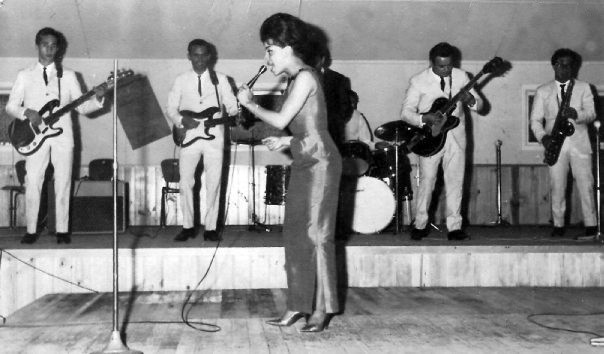
Māori Hi-Liners at the Parramatta Station Hotel, 1960s: Helene Johnson in front.
The Māori Volcanics arrived on the scene and started doing gigs on the same circuit. They were also a very polished group. The line-up comprised Nuki Waaka on bass and saxophone; his wife Mahora, vocalist; John Nelson, lead guitar; Gilly Gilbert on drums; Tui Teka, vocalist, comedian, saxophone and trumpet; and Hector Epae, vocalist, comedian and saxophonist. They were also to become popular with the locals around Manchester.
It was July-August 1967 that Derek booked us into the Blackpool Opera House with the Bachelor Boys, Dame Margot (the operatic singer), and our very own John Rowles. It was great to catch up with John again, since way back in the Tiki Village, Australia, days. He was promoting his hit songs ‘Hush Not a Word to Mary’ and ‘If I Only Had Time’ and, as we know, John went on to become a recording star and a very Kiwi household name.
Glasgow, Scotland, was our next stop and it was here we auditioned a female singer. She was a young 18-year-old Scottish lass, Marilyn, with a jazzy voice. We put her on show to the public in the last week. There was standing room only, the place was bursting at the seams. The Scots wanted a piece of their Scottish bonnie lassie. Marilyn was very talented and became a big part of our line-up.
We were booked back in Manchester and Derek was very happy with our Scots girl and he asked Barry – who had his Australian girlfriend, Judy, travelling with us to England – if she could join the show also. There was a bit of “humming and haaaring” because Judy didn’t have a singing voice but she was quite attractive. With both girls dressed up and looking good on stage they certainly created good vibes and gave the band a huge lift. It was my ‘What Kind of Fool Am I’.
Our show would usually go on for two hours and then we would pack up our gear and move on to another club if we were doing two shows a night. Jeez, it was blooming hard work – but on payday it was worth it!
It was when back in Wiesbaden, Germany, back on the American army circuit and the Māori Volcanics were working other parts of Germany, that I had a talk with the incomparable Tui Teka. I wanted to buy a saxophone, so off we went to Frankfurt, about 100 km away, and we bought my first sax. He taught me scales and taught me how to play. I practised at every opportunity until I became competent enough to play on stage. I would go to see Tui to get more tuition and within a week he would say, “Hey boy, I’d better not teach you too much, you’ll be better than me! Ha ha!” That was just typical of Tui. He was a master teacher. This instrument was to become a major part of my life.
Final tour 1967-1969, England and Europe
It seems such a long time ago now that Prince Tui Teka bought my first saxophone for about 3000 Deutschmark, roughly about NZD $1500, I think. Yeah, man, it was mine and we were off back to Germany, Mannheim, playing at a nightclub on the same billing as a famous Negro guitarist entertainer named Ben E King.
We got together in our changing rooms after our shows and he showed me his style of playing guitar. I learned a lot from him during our sessions together. He was a real cool dude.
It was all short-lived as I had more important things to do in playing my saxophone. It was at our next venue in Karlsruhe that my big moment of glory came! I played my saxophone for the first time on stage, playing second parts to Ben Moeva. I was nervous but Ben managed to pull me through. We worked on our choreography and timings and gained more confidence with each show we performed. With Ben coming from the Cook Islands and sort of semi-taught, he couldn’t teach me much so I had to practise my scales and basic parts for our show until I became very confident. At one stage, I was enjoying it so much I took over the lead part. Ben was very proud of me.
After three months away, it was back to Manchester for a rest and a catch-up with some of the groups at the hotel. I decided that I wanted to move out of the hotel environment and go flatting on my own and have my own space, cook a good old-fashioned boil-up and have a decent feed. There were plenty of single flats about and reasonably priced.
My flat was to become Prince Tui Teka’s second home. He used to use it often when I was out on the road or he’d just crash out with a mattress on the floor, typical Tui.
It was December 1968, in the flat, with more tutoring from Tui, that we started reminiscing about our whānau in New Zealand. Tui grabbed hold of the guitar, started plucking away quietly and said to me, “Hey Kel. Listen to this.” It was his composition of the famous song titled ‘Mum’. He sang it with such great feeling and love that I cried. Man it was beautiful and I believe this was the new beginning for the future years of this song, which was to become a household name and I was the first to hear it sung by the incomparable Prince Tui Teka.
“Hey Kel, Listen to this,” said Tui Teka. It was a song called ‘Mum’. He sang it with such great feeling and love that I cried.
Because of his size – man, he was massive – he struggled badly with his legs and would try to rest them often whenever he could at my flat. But to see him on stage performing you wouldn’t think he was suffering. He gave his all. Prince Tui was the whole performing package.
Sometimes, on our days off, I would get out on the loose with Hector Epae and Gilbert Smith. They weren’t shy of putting away the ales. John Nelson, their lead guitarist, was the quiet dude, nice guy. Nuki and Mahora Waaka were Mormons and never touched alcohol. They were a great couple.
Musically, the Māori Volcanics were a great showband and I learned a lot by following their example. My personal performance on stage improved each time I played lead solo on the saxophone and Ben didn’t mind because it would free him up to play the xylophone in our Polynesian show and our final number, which was ‘When the Saints Go Marching In’ with both our saxophones going full blast. Ben would finger the bottom keys on my saxophone and I would finger the top keys on his. This was a gimmick that proved very popular with most of the showband saxophonists overseas.
We would head off to Spain and do shows in Madrid and go along to the famous bullfights. I was quite taken by the awe in which they were presented live, and with all the people shouting “Ole! Ole!” and drinking Spanish vino as this beautiful beast comes charging out of the pit into the arena, where two horsemen were waiting – heavily armour-plated and protected from the horns of the bull. They are called picadors. Also in the arena were three or four clowns poking, jibing, pulling and thrusting piccolos (short spears) about a metre long into the shoulders of the bull, tiring it out. All this takes about an hour, then the big announcement. As the matador makes his grand entrance his name is screamed into the loudspeakers. “Ole! Ole!” the fans go wild as he goes through his ritual. This beautiful beast is all but on its knees, yet still willing and powerful in defeat, knowing the outcome. As the matador makes the final blow the bull collapses on its knees and onto the ground. “Ole! Ole!” as the matador shows the ears to the Presidente.
This is their sport and culture, whether you left the arena excited, overwhelmed or like a stunned mullet, as I was. I swore never to go to another bullfight ever again.
The tour of Spain was approximately four months long and Tony and I would have a separate unit where we would cook our own meals and Tony, being an ex-chef, used to cook up some really choice meals, especially hot, spicy, curry foods. I used to chip in with pork chops and veges. Pinky, Ben and Dennis had their unit as well as Barry and the two girls, but mostly they used to eat out at any local restaurant. That was how we used to work it when we were away.
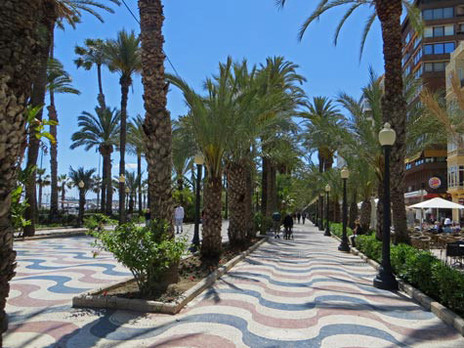
The Māori Hi-Liners - Alicante Spain Paseo Esplanada de Espana
We had two weeks in Madrid, a week in Valencia then travelled down to Alicante for another week’s show and further down the coast of Gibraltar, Cadiz to Seville, a beautiful coastal township with friendly people away from the hassles of Madrid.
The girls were working really well together, especially harmonising, and their stage presentation and looks were an asset to the group. We were full of praise for them, especially Marilyn, who was this shy Scottish lass but on stage with her powerful voice she was very good. Judy chipped in very well. Pinky and Dennis worked hard on their performance as well as Ben and I. By this stage I was doing all the lead on the saxophone. Everything was ticking over like clockwork and we were all feeling great.
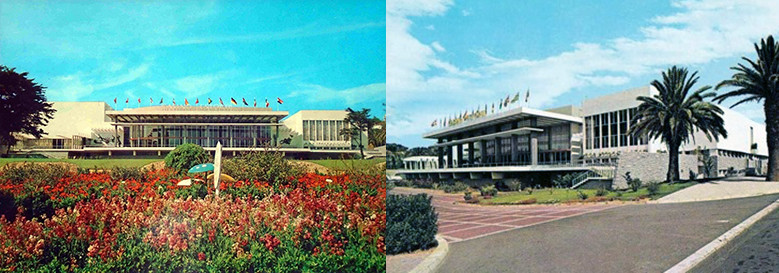
The Māori Hi-Liners - Casino Estoril, Portugal
We travelled through the border into Portugal where we were to perform in Lisbon at the grand opening of the €5 million Casino Estoril, performing with some internationally acclaimed artists such as the fabulous Bluebell Dancing Troupe from England, juggling troupe from Sweden, a ventriloquist from Hungary, singing sensation Amelia from Spain, the Māori Hi-Liners from New Zealand – and top of the bill was a Portuguese operatic singer named Anna.
The show would be a four-hour “show spectacular” for the upper-class Portuguese in the main casino. We did a second show which was for the middle-class on the second floor below. We performed our full two-hour show , and a lot of the audience from the first show would come down and watch our show. It was always packed out.
We enjoyed our stay in Lisbon but sadly after three weeks we were on the move again further up the coast to San Sebastian for two weeks for more shows, then a further two weeks in Switzerland, performing in Zurich. What a lovely place, sightseeing the lovely Matterhorn. The people were very friendly and the green, clean, fresh air reminded me of home.
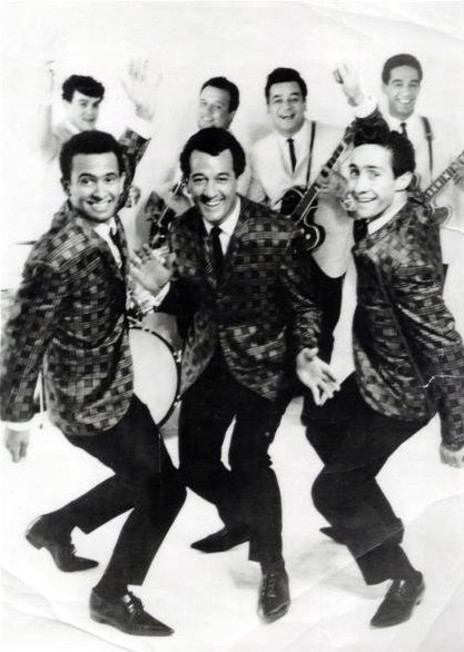
Māori Hi-Liners. Back row (L-R): Gimmick Cameron, Robbie Ratana, Matti Kemp. Front centre: Barry Erickson. Also present: Gavin Ware, Matt Tenana.
From there it was back to Stuttgart, Germany, performing at more American bases where we teamed up with The Platters. It was great to be on the same stage as them and always a pleasure to perform to the American troops.
It was back to England, earning top dollar – and how the time flies. In mid-1969 Derek, our manager, said to us that we’d earned a break back to New Zealand. Wow, that was music to our ears.
He had booked us on the Southern Cross liner. It was September when we said our farewells to our mates, the Volcanics, Castaways and friends.
Little did I realise what was in store for me! On the ship I met a lovely Dutch girl, Maria Johanna, returning to Australia from Holland, who was to become my wife.
Sadly, I was never to return to England with Barney and the boys from the Māori Hi-Liners. It was in the early 1970s that Red Kerehi wanted to form a band with John Nini, who was back from Australia, Warren “Woggie” Pomana, Tom Paku, Henare Manaena, Peter “Noddy” Don (the only Pākeha in the band), and yours truly. The band was called The Project 7.
There were another two groups around at the time, one was Melvin Carroll and The Signatures with Dave Morris, Hector Waimutu, and my brother-in-law Tom Tamati. The other was the Thorne Family Band.
We were a great family musical team and gave musical enjoyment to the people of Wairarapa, playing cabaret, dance and social music.
--
Keremenata Haeata passed away in October 2010.
This piece first appeared in Wairarapa Moana Mailer magazine in three parts: issue 7 (September 2007), issue 9 (March 2008), and issue 14 (May 2009), and is republished with permission. Thanks to Henare Manaena of the Wairarapa Moana Incorporation.